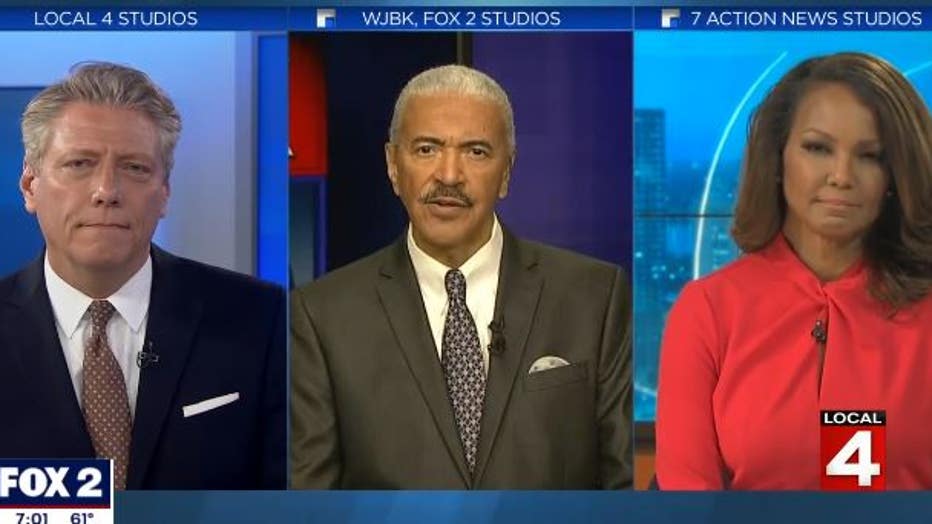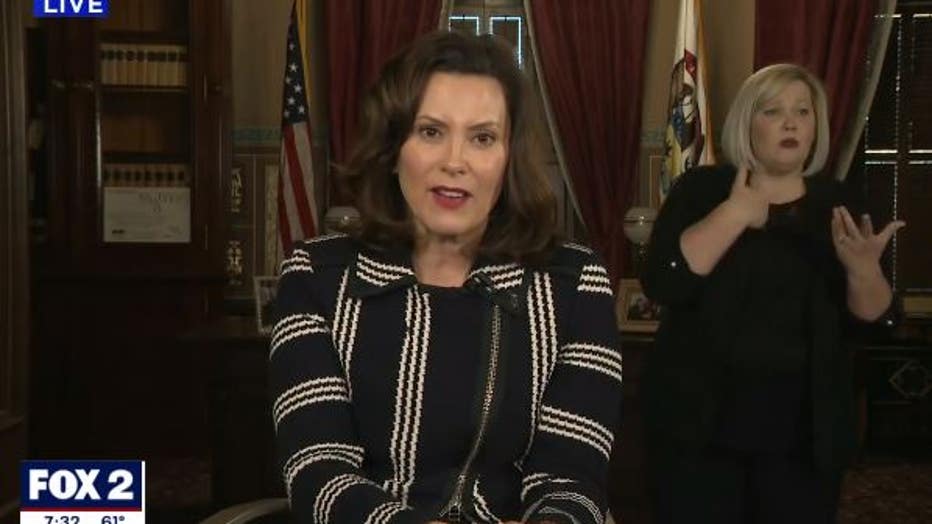FOX 2 partners with TV stations for Gov Whitmer Town Hall on COVID-19 pandemic

WATCH: Gov. Gretchen Whitmer holds town hall with Detroit TV stations
Detroit's three biggest TV stations came together to hold a remarkable town hall event with Gov. Gretchen Whitmer (full video)
Detroit's three television stations joined together to talk with Governor Gretchen Whitmer about what Michiganders need to know about coronavirus/COVID-19. Whitmer addressed the state during the Town Hall on FOX 2, WDIV, and WXYZ. We partnered with the other two stations to produce this unique opportunity for all of us to come together.
Governor Whitmer spoke live from Lansing via satellite with WDIV's Devin Scillian, FOX 2's Huel Perkins and WXYZ's Carolyn Clifford asking questions we all need to know, to stay safe.
From unemployment to schools to the automotive industry, Whitmer touched on a variety of topics in the hour-long session. Below are some highlights.
Educational impact
The first question she fielded was on the school year which Whitmer effectively ended in-person sessions with an announcement earlier on Thursday. Whitmer plans to take education remote for the remainder of the school year.
Whitmer: “We have 1.5 million kids in our schools and over 900 different districts. We know that our education system is not equitable. Right now when we think of how to meet the needs of Michigan children, each district has different needs and resources.
"Some (students) will get information online, some will take home paper packets, some will get information over the phone. This is not a one-size fits all. What we are doing is releasing a lot of the traditional structures."

Gov Gretchen Whitmer Town Hall on Michigan’s efforts against the coronavirus
FOX 2 Detroit, WDIV and WXYZ all partnered for a Town Hall program with Gov. Gretchen Whitmer and the state's efforts against the coronavirus pandemic.
Real-time statistics
Whitmer also spoke of sharing the coronavirus numbers daily to be as transparent as possible. She also mentioned the probability of most everyone in the state being affected by knowing someone impacted by COVID-19, talking about the recent passing of State Rep. Issac Robinson (D-Detroit).
Whitmer: "We are trying to be transparent. We are trying to share info in real time. We want to make sure as people conduct their own lives, we share the numbers so people know the seriousness of the situation.
"It’s very likely all of our lives will be touched by COVID-19. That is why it is so important to remember that each one of these numbers isn’t just a number it is a life that has been cut short. We know that everyone staying in saves lives. Ask that everyone does their part, it is essential."

Stay at home, stay safe order
"I put the order in for 3 weeks (until April 14) which fit the science at the time. As long as all the science keeps coming in pointing towards the stay at home order (mitigating the spread of COVID-19 we will enforce it.) I was glad the president embraced 30 days it was a dramatic step from where the White House had been.
"There is a possibility I will have to extend the stay at home order but precisely how long or when I will announce it I am not prepared to say right now."
RELATED: New Michigan executive order sets fines up to $1,000 for violating social distance rules
'Essential' vs. 'Non-Essential'
Whitmer: "I think this is an unprecedented time, the question of essential vs non has created questions. If it is not a life-sustaining energy than it is probably not essential. It is not obvious what all the gray areas are. The majority of our businesses are doing it the right way those who are questing should not be playing fast and loose (with the rule).
"This disease does not discriminate. I understand economic anxiety. But here is what I know: Every time you are out and about you are risking everyone’s health as well. We have to assume that everyone is capable of carrying it around. The more exceptions there are, the longer this will go on, the more people will get sick and the more people will die."
RELATED: Frequently asked questions about Michigan's 'Stay Home, Stay Safe' order
State-wide curfew
Whitmer: "I don’t (see a need) at this juncture. (Flint) Mayor Neeley knows his community well, and made the best decision in keeping from people congregating. As we look statewide, people should not be congregating in private homes and we (will look at ways to enforce that). As far as a statewide curfew we have not deemed that is necessary at this juncture."

Where is the Finish Line?
Whitmer: "That is the question no one can answer with great confidence. We need more testing. Once we have more testing then we can know how rampant COVID-19 is. When we know the number of people being hospitalized, that will be another data point. I am listening to a lot of experts. I have a group of people helping me look at all the sectors in our economy to see what a responsible ramp up would be.
"We have seen a second wave in other countries. The worst thing that could happen is to think that we are out of the woods and to see it come back."

